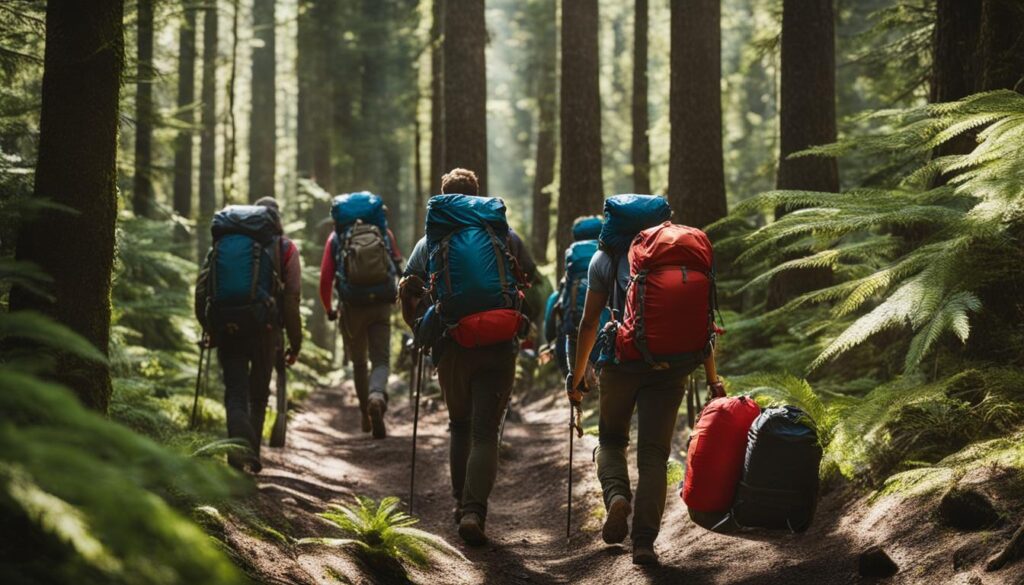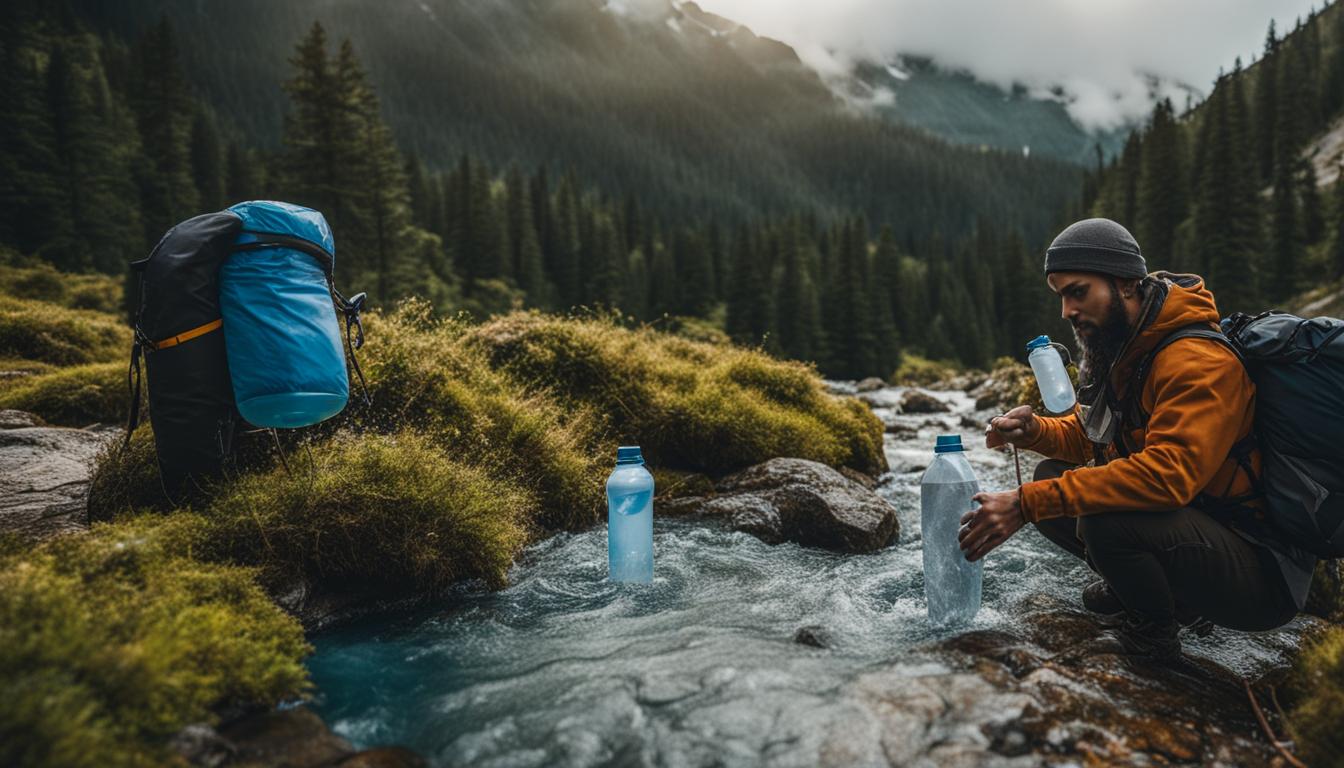Backpacking in sensitive areas requires a conscious effort to minimize our environmental impact. As outdoor enthusiasts, it’s our responsibility to adopt responsible backpacking techniques and eco-friendly practices, ensuring that we leave nature undisturbed. Let’s explore some effective strategies for reducing our ecological footprint while backpacking.
Key Takeaways:
- Choose eco-friendly gear and equipment, such as lightweight and sustainable alternatives.
- Practice proper waste management, including packing out all trash and disposing of it responsibly.
- Respect wildlife and their habitats by keeping a safe distance and avoiding feeding or disturbing them.
- Stick to designated trails to minimize erosion and protect fragile ecosystems.
- Conserve water by utilizing water filters or purifiers and minimizing unnecessary water usage.
The Leave No Trace Principles for Backpacking in Sensitive Areas

When backpacking in sensitive areas, it is crucial to minimize our impact on the environment. The Leave No Trace principles, established by the US Forest Service and NOLS, provide valuable guidance for responsible outdoor travel. These principles are not strict rules but a spectrum of guidelines that can help us reduce our ecological footprint while enjoying the wilderness.
1. Plan ahead and prepare
Before embarking on a backpacking trip, it is essential to plan and prepare adequately. Research the area you will be visiting, understand the rules and regulations, and obtain any necessary permits. Plan your meals to minimize waste and choose lightweight, durable gear to reduce your overall impact on the environment.
2. Travel and camp on durable surfaces
When backpacking, stick to established trails and campsites to avoid damaging delicate ecosystems. Avoid trampling on vegetation and sensitive areas by staying on designated paths. Choose durable surfaces such as rock, gravel, or dry grass to set up your camp and minimize your impact on the natural surroundings.
3. Dispose of waste properly
Proper waste disposal is crucial to maintaining the cleanliness and integrity of sensitive areas. Carry out all trash, including food waste, and dispose of it in designated receptacles or pack it out with you. Use biodegradable soap sparingly and at least 200 feet away from any water sources to minimize contamination.
4. Leave what you find
Resist the temptation to take souvenirs or natural artifacts from sensitive areas. Leave rocks, plants, and other natural objects as you found them to preserve the ecosystem’s balance and contribute to the overall health of the environment.
5. Minimize campfire impacts
While campfires can be enjoyable, they can also have significant impacts on the environment. Whenever possible, use a lightweight camping stove instead of building a fire. If you must build a fire, use existing fire rings and keep it small. Only burn small sticks and fully extinguish the fire, ensuring no embers are left unattended.
6. Respect wildlife
Observe wildlife from a distance and avoid disturbing their natural behavior. Do not feed or approach animals, as this can disrupt their natural diet and behavior patterns. Store food securely to prevent wildlife from becoming habituated to human presence.
7. Be considerate of other visitors
Respect fellow backpackers and other visitors by keeping noise levels low and maintaining a friendly and inclusive attitude. Yield to others on trails, avoid playing loud music, and respect designated quiet zones. By being considerate of others, we can ensure everyone enjoys a peaceful and harmonious outdoor experience.
By following the Leave No Trace principles and adopting sustainable backpacking tips, we can minimize our ecological footprint while enjoying the beauty of nature. Let’s be responsible stewards of the environment and preserve these sensitive areas for future generations to explore and enjoy.
Additional Tips for Responsible Backpacking in Sensitive Areas
When it comes to backpacking in sensitive areas, it’s important to go beyond the basic principles of Leave No Trace and adopt a conservation-minded approach. By implementing low-impact backpacking strategies and following ethical backpacking principles, we can further reduce our ecological footprint and help protect these fragile environments.
1. Minimize Campfire Impact
While campfires may be a quintessential part of the outdoor experience, they can have a significant impact on the surrounding ecosystem. To minimize this impact:
- Use established fire rings or designated fire pits whenever possible.
- Only use dead and downed wood for your fire and avoid cutting down live trees or breaking branches.
- Keep your fire small and never leave it unattended.
- Completely extinguish your fire before leaving the campsite by dousing it with water and stirring the ashes.
2. Practice Proper Waste Disposal
Proper waste disposal is crucial for maintaining the cleanliness and hygiene of sensitive areas. Here are some tips to follow:
- Carry out all your trash, including food wrappers, toilet paper, and other non-biodegradable items.
- Dispose of human waste properly by digging a cat hole at least 6 to 8 inches deep and at least 200 feet away from water sources.
- Pack out all hygiene products, including wet wipes and tampons.
- Consider using a portable camp toilet or wag bag system for solid waste disposal.
3. Respect Wildlife and Vegetation
One of the joys of backpacking is encountering wildlife and observing the natural vegetation. To ensure minimal impact on these delicate ecosystems:
- Keep a safe distance from wildlife and never feed them.
- Do not trample or disturb vegetation, especially in sensitive areas such as alpine meadows or fragile desert ecosystems.
- Stay on designated trails to avoid damaging vegetation and causing erosion.
- Leave natural objects, such as rocks, shells, and plants, where you find them.
By following these conservation-minded backpacking methods, practicing low-impact backpacking strategies, and adhering to ethical backpacking principles, we can ensure that our adventures have a minimal impact on the environment. Let’s strive to protect and preserve these sensitive areas for future generations to enjoy.
Conclusion
When it comes to backpacking in sensitive areas, it’s crucial that we prioritize sustainable practices and responsible outdoor adventure. By following the Leave No Trace principles and adopting conservation-minded methods, we can ensure that our ecological footprint remains minimal.
As outdoor enthusiasts, it is our responsibility to be mindful of the impact we have on the environment. Whether it’s minimizing waste, respecting wildlife and vegetation, or choosing eco-friendly travel options, every action counts in preserving the natural beauty of our surroundings.
Together, we can make a positive difference in the places we love to explore. By embracing sustainable backpacking and embracing eco-friendly travel, we can enjoy the outdoors while also protecting it for future generations. Let’s be responsible stewards of the environment and continue to make conscious choices that promote the well-being of our planet.

